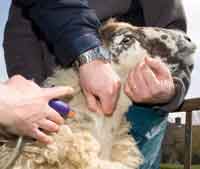Plan vaccination to prevent bluetongue BTV8

Bluetongue may be slipping from the minds of some farmers, but those in the south east have been warned against complacency
Bluetongue strain eight (BTV8), despite the lack of cases in indigenous animals last year, still poses a massive threat to UK livestock. Farmers should plan their vaccination strategies with their vets immediately to ensure protection against the disease.
Speaking at a Livestock Health South East-organised bluetongue briefing at Ashford Market, Kent, last week James Mulluneux of NFU south east said the disease was still raging in Continental Europe and the discovery of new strains of the disease there in recent months shouldn’t distract UK farmers from the challenge posed by BTV8. “This is still the strain which poses the biggest threat to UK stock, as it is the one we’ve already experienced here and could well still be circulating here.”
The only way to ensure full protection for stock is to vaccinate them, he warned. “Once again vaccination in England and Wales will be voluntary, so the onus is on farmers to protect their own animals. While some farmers may prefer to see a compulsory programme in place this could result in slower vaccination of stock and would mean vets would have to become involved, too.”
Farmers ordering vaccine in the next month or so will need to check the expiry date on vials though, he said. “There are more than 12m doses of last year’s supply left over and these will be supplied first. But any of last year’s vaccine in 20ml vials has an expiry date of the end of February and some of the 50ml packs expire at the end of March.”
But vet Jules Dare of the Westpoint Vet Group told the meeting that DEFRA and the vaccine manufacturers were in discussions about extending the expiry date of these packs. “So long as the seal hasn’t been broken and the vaccine has been refrigerated, there shouldn’t be a problem with extending the dates.”
Looking further ahead, Mr Mulluneux said that at the moment EU rules only allowed countries to vaccinate against strains of the disease present in the country. But discussions were ongoing to allow preventative vaccination against other strains. “This should allow the UK to protect against BTV1 in due course, depending on the risk level of the disease spreading here.”
Reminding farmers present of the symptoms, Mr Dare said suckler herd managers should look out for cows with sunburnt udders. “It appears that bluetongue hypersensitises the udder to sunlight, meaning the outside of the udder burns easily, while the rest of the udder remains fine. Cows suffering like this will be reluctant to allow calves to suckle.”
With regard to timing of booster vaccinations for stock vaccinated last year Mr Dare said farmers should give vaccinations when it was most convenient to them, bearing in mind it took three weeks post-vaccination for full immunity to develop. “Booster vaccinations should be dealt with as soon as is practical. For cattle this largely means vaccinating them before turnout, to ease the need to gather them again.
“For sheep farmers there have been questions over whether vaccine could be given at the same time as other doses, such as clostridial vaccines. However, vaccine manufacturer Intervet/Schering Plough has recently said its bluetongue vaccine can be used at the same time as other killed vaccines in its portfolio, such as clostridial products.”
Vaccine can be given to in-lamb ewes and in-calf cows and research suggested some maternal antibodies would be passed to their offspring, he added. “But these antibodies are only likely to last a couple of weeks.”
Mr Dare also said farmers needed to check which vaccine they would be using, as three were available, all with different specifications. “Intervet/Schering Plough’s product, Bovilis BTV8, is the one south-east farmers will be familiar with, having used it last year. This one can be given to all stock older than one month and sheep require one initial dose and cattle two doses. When it comes to booster doses, all stock will require one booster injection.
“Merial’s, product BTV Pur 8, can only be given to stock more than three months old and Fort Dodge’s vaccine, Zulvac 8 Bovis, is only licensed in cattle and can only be given to stock more than 2.5 months old. Prices for the three products will also vary and all have to be used within eight hours of the seal being breached.”
- For more information on bluetongue and its control see FW’s exclusive bluetongue vidoes at www.fwi.co.uk/bluetonguevideo
